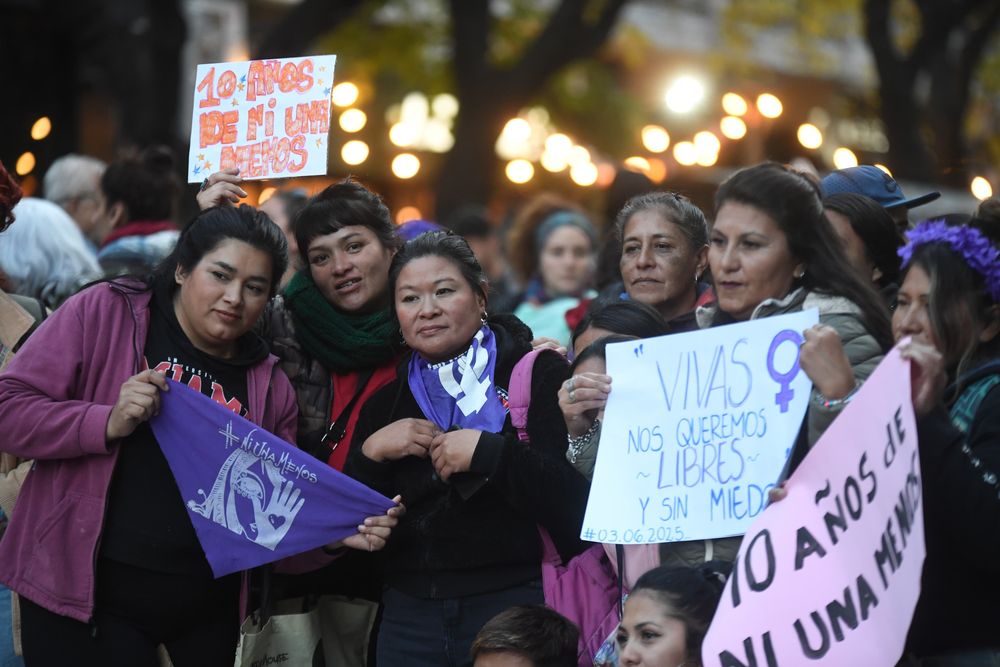Mendoza marched through the streets for the 10th anniversary of the Ni Una Menos movement.

On Tuesday, June 3rd, thousands of women gathered in downtown Mendoza to mark the 10th anniversary of the Not One Less movement. This social movement emerged in Argentina and later spread to other countries, responding to the repeated femicides , the murders of women in situations of gender-based violence.
The first time was 10 years ago, on June 3, 2015, and this year, in an adverse context for feminist movements in the country, they are once again taking to the streets. This is adverse for many reasons, but fundamentally because femicides continue to occur: 93 so far in 2025, one every 31 hours. But also because the national government denies the existence of such a legal entity.
In Mendoza, the rally at kilometer 0 was scheduled for 6 p.m. this Tuesday, but the protesters arrived several minutes after the scheduled time . Despite the cold, the march was well-attended, with women of all ages joining the mobilization chanting "Not One Less, We Want to Live." The march culminated in Plaza Independencia , where the event and artistic closing ceremony led by the movement took place.
Not One Less March Mendoza 2025

The Andes / Ramiro Gómez
Among the crowd , banners bearing messages against Javier Milei's government, flags from La Cámpora, the Popular Feminist Tide, and other social organizations stood out. Many Palestinian flags were also seen, including one particular banner that read: "Argentina will not be the new Palestine." A major police operation involving dozens of officers was also deployed.
During the march, it was observed that the protesters were carrying photos of victims of femicide in Mendoza . Additionally, next to one of the fountains in Independence Square , a tribute was held for all the women who were victims of femicide, where many women came forward to leave flowers and lit candles for their deceased comrades.
Not One Less March Mendoza 2025

The Andes / Ramiro Gómez
“Since that first cry of pain for those who are no longer with us, of anger at the lack of justice and a state that responds with policies to prevent the violence we continue to suffer, little has changed. They keep killing us. In these 10 years, we've had 100 femicides in our province alone,” expressed women from the Ni Una Menos Mendoza movement. They added: “The numbers are chilling, as is the state's neglect. More than 60% of the aggressors are the victims' partners or ex-partners. And in 70% of cases, the crime occurs inside our homes. The most dangerous place in a situation of violence continues to be one's own home.”
In another excerpt from the speech, the Ni Una Menos movement took aim at the provincial and national governments: "We know that official processes are long, and in these times, it's clear that they're not linear either. The cruel setback we've experienced under Milei's government and Cornejo's continued lack of policies in this regard are overwhelming." They also expressed that "both the national and provincial governments have no qualms about openly expressing their hatred, while, under the cry of ideological programs, they systematically destroy every policy of prevention and aid for victims and their families, while the applause of a chorus of violent people celebrating and a large part of society impassively watching this present dichotomous horror we're experiencing can be heard," they stated.
Not One Less March Mendoza 2025

The Andes / Ramiro Gómez
In closing, they emphasized that the struggle remains intact . "Ten years after the first call for action, we are still in the streets, still organizing and fighting, because we know no other way to fight and resist, until this patriarchal, capitalist, and extractivist system ends, because we owe it to those we miss and to those yet to come, because they took so much from us that they finally took away our fear."
Embed - Massive march in Mendoza for the 10th anniversary of Ni Una Menos
In 2015, grief took to the streets after several events and brought together diverse sectors across the country in massive marches. This made it possible to raise awareness, gain public attention, and transform an issue that had seemed hidden, with claims filed in individual cases, into a collective demand.
“Ni Una Menos” was born out of disgust with sexist violence, which has its cruelest aspect in femicide,” describes this collective, which took to the streets with a univocal cry: “We want to live.”
In Buenos Aires, the march has been scheduled for Wednesday the 4th. The decision was made at a meeting and is intended to join the demands of retirees, who march as they do every Wednesday, and thus create a broader front during the demonstration.
They will meet in Plaza de los Dos Congresos at 4 p.m. “Because austerity and cruelty are not faced alone. We embrace retirees. Ten years after the first Ni Una Menos (Not One Less), we continue to shout together: the debt is ours!” the movement announced.
losandes





